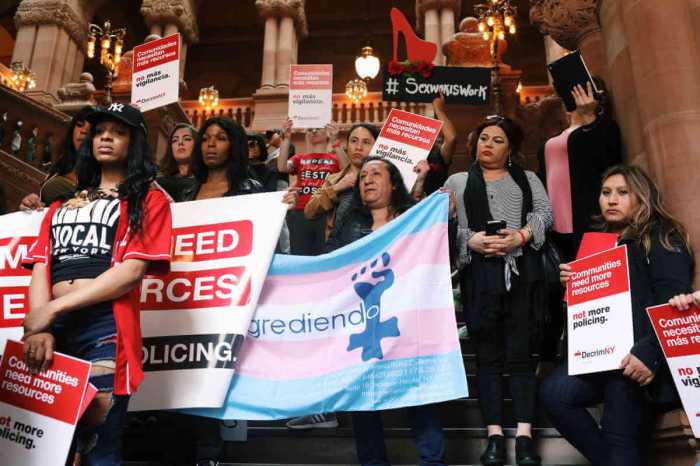Bronx Councilmember Ritchie Torres led the drive to improve overdose prevention at city homeless shelters and other facilities servicing at-risk populations. | DONNA ACETO
A measure approved by the City Council on October 31 guarantees that homeless shelters across New York will be staffed by people trained to prevent fatal overdoses.
Three years ago, drug overdose became the leading cause of death among the homeless. The new legislation expands the city’s public health commitment to reduce fatal ODs. The bill, sponsored by Ritchie Torres, an out gay councilmember from the Bronx, requires that employees at city shelters and those at non-profit providers who operate single-room-occupancy hotels under contract with city agencies, such as the HIV/ AIDS Services Administration (HASA), be trained in the use of naloxone, which is sold under the brand name Narcan.
Facilities serving opioid at-risk populations must train staff, residents in Narcan use
Torres told the Council that his bill “will save lives. The city will be required to train shelter providers and shelter residents in the administration of naloxone, which has been shown to reverse, in real time, the impact of an otherwise fatal opioid overdose.”
The device is injected into a person’s nose and sprays an opioid antagonist that revives a person’s breathing. The device is designed for use by lay persons and can be used after just one training session.
The new local law requires that in every city shelter and single-room-occupancy hotels under its jurisdiction there be at least one trained person on duty at all times. It is expected that training will be offered to many shelter employees to ensure that a trained staff member is always on duty.
The legislation expands existing programs and represents an extensive collaboration among advocates for the homeless, including VOCAL-NY and Torres. In an emailed statement, city Human Resources Administration Commissioner Steven Banks offered an upbeat assessment of the new measure, writing, “This legislation would take our comprehensive training efforts even further, expanding preparedness programming to additional facilities and offering new training opportunities to clients.”
Under the law, homeless shelter and SRO residents will also be trained in the use of Narcan, something that VOCAL-NY, which works directly with the city’s drug-using population, hailed as a step forward in public health responsiveness.
Jeremy Saunders, co-executive director at VOCAL-NY, was ebullient in telling Gay City News, “Passage of 1443 would not have been possible without Councilmember Ritchie Torres and Commissioner Steve Banks. But most importantly, it took shelter residents telling their stories and demanding that they be included into the legislation.”
Saunders then praised several homeless New Yorkers who pressed the importance of training shelter residents themselves in the use of Narcan, saying, “Thanks to people like Stevie Weltsek, Sarah Wilson, Jeffery Foster, and many others, the law was expanded to include the training of shelter residents and reporting to ensure it is really happening.”
Banks echoed that message, saying, “We remain committed to continuing to empower more New Yorkers to be overdose first responders, ready to save lives.”
Public health prevention of overdose deaths depends on wide distribution of Narcan kits so that a user gets immediate help from others during a crisis. During an overdose episode, breathing is suppressed and while waiting for an ambulance a person might suffocate. The city health department has long encouraged ordinary New Yorkers to become overdose first responders. This legislation creates a framework for helping drug users to help themselves in preventing fatal overdoses.
In his remarks to the Council, Torres summed the issue up saying, “One need not be a doctor to administer naloxone, and one need not be an emergency responder to save a life on a moment’s notice. All that is required is a basic training, a basic drug, and a basic show of compassion towards those in crisis.”



































